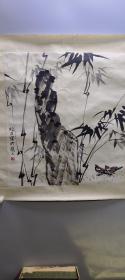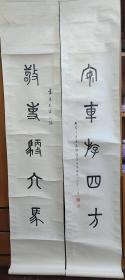
汉语违实成分研究
¥ 10 1.7折 ¥ 58 八五品
仅1件
上海闵行
认证卖家担保交易快速发货售后保障
作者王宇婴 著
出版社中国社会科学出版社
出版时间2013-12
版次1
装帧平装
货号63-3
上书时间2023-02-08
- 店主推荐
- 最新上架
商品详情
- 品相描述:八五品
图书标准信息
- 作者 王宇婴 著
- 出版社 中国社会科学出版社
- 出版时间 2013-12
- 版次 1
- ISBN 9787516138243
- 定价 58.00元
- 装帧 平装
- 开本 16开
- 纸张 胶版纸
- 页数 286页
- 字数 196千字
- 【内容简介】
- 《汉语违实成分研究》对汉语违实意义的实现进行了探讨。作者王宇婴首先归纳和整理了对违实义有直接或者间接贡献的词汇结构和句法表达,包括时间因素、假设连词、否定词、反义疑问句、人称代词等,在对他们的作用从语义、语用角度进行分析的基础上,对违实义推导过程做概括性的描述,证明可以通过三层语境实现。
- 【作者简介】
- 王宇婴,女,生于浙江嘉兴,现执教于澳门理工学院语言暨翻译高等学校,博士。研究领域是形式语义学、语用学,口译理论与实践。现阶段主要从事汉语反事实条件句的研究。
- 【目录】
-
Foreword
List of Abbreviations
CHAPTER ONE INTRODUCTION
1.1 Theories of Conditionals and CFCs
1.2 Goals of This Book
1.3 Some Basic Concepts of Conditionals
1.3.1 Various Conditionals
1.3.2 Examining the Grammatical Features of Conditionals
1.4 Structure of This Book
CHAPTER TWO A SURVEY OF CONDITIONALS AND CFCS IN CHINESE
2.1 Chinese Conditionals
2.1.1 Conditionals vs.Hypotheticals:A New Definition
2.1.2 Subclassification of Conditionals
2.1.3 Chinese and English Conditionals
2.1.3.1 Chinese Donkey Sentences
2.1.3.2 Tense Expressions
2.1.4 Some Grammatical Features of Conditionals in Chinese
2.1.4.1 Hypothetical Conjunctions
2.1.4.2 The Components of a Conditional
2.1.4.3 Subjectivity in Conditionals
2.1.4.4 Conditional as a Typical Irrealis Modal Sentence
2.2 Some Basic Concepts about CFCs
2.2.1 Definitions
2.2.2 CF Sentence as Subjectivised Construction
2.2.3 Modality and CFC
CHAPTER THREE LITERATURE REVIEW
3.1 Early Stage(before 1980s)
3.2 Middle Stage(mid 1980s to early 2000s)
3.2.1 Guohua Chen(1988)and Yan Jiang(2000)
3.2.2 Weixian Wang et a1.(1994),Fuyi Xing(2001) and Jiaxuan Shen(2003)
3.3 Recent Stage(Since the beginning of the 21 st century till now
3.3.1 Realis VS.Irrealis—Xiaoying Luo(2006),Min Li(2006),Xiaoling Wang(2007),Xueping Zhang(2008)
3.3.2 Psychological Experimental Approach
3.3.3 Linguistic Approach(Yaoshi(要是)VS.Yaobushi(要不是)一Yuying Su(2008))
CHAPTER FOUR CF INGREDIENTS(Ⅰ):TEMPORAL EXPRESSIONS
4.1 A Brief Review of the Previous Studies on Temporal Structure in Chinese
4.1.1 Tripartite Temporal Structure—Ping Chen(1988)
4.1.2 Formal Approaches—Yan Jiang&Haihua Pan(2005)
4.1.3 Temporal Reference—Yang Gu(2007)
4.1.4 Relevance—Account of le(了)and guo(过)一Ljungqvist(2007)
4.2 An Analysis Based on Tripartite Temporal System
4.2.1 Phase
4.2.2 Aspect
4.2.3 Tense
4.3 More on Temporal Anchoring
4.4 Interim Summary
CHAPTER FIVE CF INGREDIENTS(Ⅱ)
5.1 Hypothetical Conjunctions
5.1.1 Ruguo(如果)(Yaoshi(要是),Yao(要),Jiaru(假如),Jiashi(假使),Jiashe(假设),Tangruo(倘若),Ruruo(如若),Sheruo(设若),etc.)
5.1.2 Yaobushi(要不是)(Ruofei(若非),Ruobushi(若不是),Ruguobushi(如果不是),etc.)
5.1.3 Wanyi(万一)
5.1.4 A Brief Summary
5.1.5 CF Sentences Without C0njunctions
5.2 Negation
5.3 Personal Pronouns
5.4 Rhetorical Questions
5.5 CF Enhancers
5.6 Summary
CHAPTER SIX GENERATING COUNTERFACTUALITY IN MANDARIN CONDITIONAL SENTENCES
6.1 Context Determinism vs.Ingredient Determinism
6.2 Minimalism, Contextualism and Indexicalism
6.3 A Three—Layer Context System
6.3.1 CF Ingredients:Local Context
6.3.1.1 CF Ingredients Revisited
6.3.1.2 Numbers Talk
6.3.1.3 Working Mechanism
6.3.2 Protasis and Apodosis:Compound Sentence Context
6.3.2.1 Binding Argument
6.3.2.2 From Protasis to Apodosis:A Process of Saturation
6.3.3 Macro Context
6.3.4 Interaction of Three Layers of Contexts
CHAPTER SEVEN CONCLUSIONS AND PROSPECTS FOR FUTURE RESEARCH
7.1 More on the Interpretational System
7.2 Recapitulation
7.3 Suggestions for Future Research
REFERENCES
APPENDIX Ⅰ
APPENDIX Ⅱ
APPENDIX Ⅲ
APPENDIX Ⅳ
APPENDIX Ⅴ
Acknowledgements
点击展开
点击收起
— 没有更多了 —





















以下为对购买帮助不大的评价